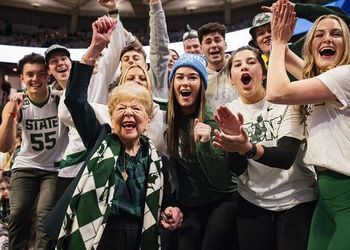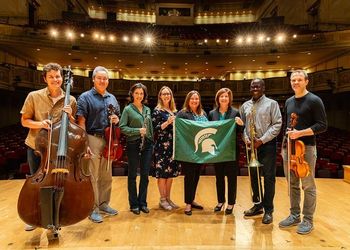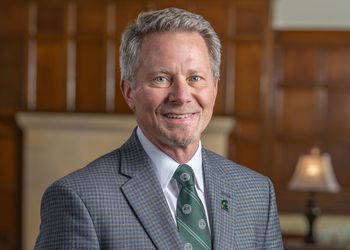RICHARD CORDRAY: LEADING FIGHT FOR ECONOMIC RIGHTS

Looking out for the powerless comes naturally for Richard Cordray, who grew up watching his parents work to improve the lives of people with mental disabilities.
Cordray, too, has built a career around service, though in a much more visible way. After years of working in law and politics in his home state of Ohio, he’s now midway into a five-year term as the first director of the Consumer Financial Protection Bureau, created by Congress after the 2008 great recession to enforce fair lending laws and educate consumers.
For Cordray, the position presents a tremendous opportunity to continue fighting for civil rights. Economic rights are civil rights, he argued in a lecture at MSU this fall as part of Project 60/50, a campus-wide initiative focused on civil rights and human rights.
“If we are to attain a true and full understanding of civil rights in this country, it must encompass not only political and legal rights, but also economic rights,” said Cordray, who earned a master’s from Oxford and a law degree from the University of Chicago.
“Because we chose to build our political structure around a free-market economy,” he said, “we must supplement our base political and legal equality with some more robust measures of economic equality and economic rights as well.”
While The New York Times editorial page called him one of the “good guys,” Cordray, a Democrat, isn’t popular in some corners of the Capitol or Wall Street. His job also keeps him away from his wife, Peggy, and their two children in Ohio. But the importance of the work makes up for all that, he said.
“When I’m away from my family, I’m able to work hard in a concentrated manner. When I am with them, every weekend, that is a predictable and more vivid chance to make the most of being together,” Cordray said in an email interview.
Beyond his career, Cordray is known for his trivia skill. He’s an undefeated five-time Jeopardy! champion, paying his student loans with his winnings.
In his undergrad days, his knowledge helped buy beer—winning drink discounts in Peanut Barrel trivia games. This, he said, “made me popular with my roommates.”
He still recalls a chance meeting after noticing a fellow trivia ace at the bar one night. Cordray had been looking for a grad student named Cliff Fox to join his College Bowl team. Fox had excelled on the team as an undergraduate and Cordray had learned that grad students could still participate.
“I asked him if he knew ‘the Fox,’ and he stared up at me and said, ‘I am the Fox.’ It was the kind of memorable moment where the movies would cue some dramatic music. For the next two years, we were one of the top teams in the country.”



